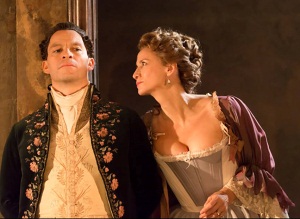IN 2013, approved Derren Brown brought his show “Infamous” to the West End’s Palace Theatre, page and I interviewed him at the time for the SUNDAY EXPRESS, republished below. Now he’s back at the same theatre again, appearing in “Miracle”, through January 16, before resuming a national tour. Full tour dates are here; http://derrenbrown.co.uk/on-stage/
***
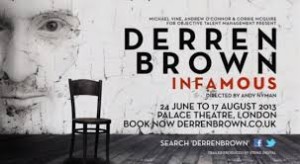 It is now ten years since Derren Brown made his West End debut with his first stage show at the Palace Theatre, and now he is back at the same address with his latest one show called Infamous. In between then and now, there have been four other West End runs, including of two shows that won him the Olivier Award for Best Entertainment in 2006 and 2012.
It is now ten years since Derren Brown made his West End debut with his first stage show at the Palace Theatre, and now he is back at the same address with his latest one show called Infamous. In between then and now, there have been four other West End runs, including of two shows that won him the Olivier Award for Best Entertainment in 2006 and 2012.
But if he has now come full circle to the same stage where he started out, Derren’s act today is very different to any he has presented before. “The feeling we had at the beginning was to create the tone of an acoustic set, like if you went to see a band that’s much less showy.”
He is sipping a mint tea in a Soho patisserie near the theatre that he likes to relax in before a show, and he’s far less showy in person than onstage, too. He is unfailingly modest, thoughtful and courteous throughout, but most of all insightful into the craft and discipline as well as the art of what makes him one of the most unique and popular stage and television entertainers in Britain today.
He never likes to tread water or recycle old shows. Having brought six brand-new shows to the West End in ten years now, he says, “Obviously if you’re a comedian, you’re used to coming up with a different show maybe every couple of years, but normally for a magician, you have your act for the whole of your life really! I remember at the beginning when we set out to do the second show thinking, ‘Oh God, I’ve got to come up with a whole new one now.’ But now I just find it is such a treat – the whole process of writing it, rehearsing it every couple of years is all part of the fun.”
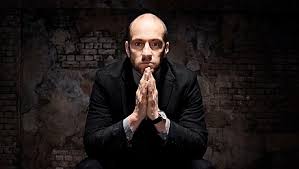 And live performance is, above all, exciting. “There’s the adrenalin of doing it, which there isn’t much of when you’re working on TV. But I do try to come up with ideas that are fun and adrenalin-filled to do on TV as much as I can – the Apocalypse TV special I did last year, in which we were ending the world for someone who had no idea what he was part of, was like that. When we began shooting, he had no idea of the huge, huge experience he was about to have.” But it was also about a larger purpose: “In order to teach him about valuing what he has, we took everything away.” Wasn’t it cruel? “Maybe, but it was very carefully plotted and the end result was so positive for him and at a much deeper level than the darkness or cruelty it took to get there.”
And live performance is, above all, exciting. “There’s the adrenalin of doing it, which there isn’t much of when you’re working on TV. But I do try to come up with ideas that are fun and adrenalin-filled to do on TV as much as I can – the Apocalypse TV special I did last year, in which we were ending the world for someone who had no idea what he was part of, was like that. When we began shooting, he had no idea of the huge, huge experience he was about to have.” But it was also about a larger purpose: “In order to teach him about valuing what he has, we took everything away.” Wasn’t it cruel? “Maybe, but it was very carefully plotted and the end result was so positive for him and at a much deeper level than the darkness or cruelty it took to get there.”
In the same way, he hopes to reach out to theatre audiences on a personal level. He’s doing so in this show by dealing with some of his own personal issues, like coming out as a gay man (relatively late – he only did so when he was 31, 11 years ago) and being bullied at school. Not that it’s a kind of replacement for therapy: “It doesn’t feel like therapy to me, but if you’re well known and have had a struggle of some sort, it’s good if there’s something people can take something from it. Not that I’ve had much of a struggle in the grand scheme of things, but people have written me letters afterwards, and it’s really nice to find that you’re a role model for them. I always find that magic is such a childish urge – the quickest route to impressing people is doing a trick, so something like that means a lot to me. It’s not silly me just showing off.”
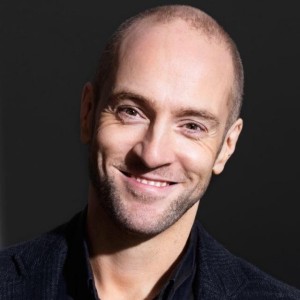 He also wants to keep taking bigger risks. “Each time I’ve done a new show, I’ve been a bit braver in terms of sheer technique I’ve been able to use. There are always sections of my shows when suddenly I need to get the whole audience involved. When I throw it out there now, I am relying on the fact that because of the prestige I have, it heightens their suggestibility, and enough people are there now who will pick up on what I do for it to happen a lot quicker.”
He also wants to keep taking bigger risks. “Each time I’ve done a new show, I’ve been a bit braver in terms of sheer technique I’ve been able to use. There are always sections of my shows when suddenly I need to get the whole audience involved. When I throw it out there now, I am relying on the fact that because of the prestige I have, it heightens their suggestibility, and enough people are there now who will pick up on what I do for it to happen a lot quicker.”
But aren’t the shows high-risk strategies? What if they don’t actually work tonight? “Every night I think it is going to fail – apart from the fact that deep down I know it won’t, because it has worked every other night!” But small things can and do go wrong from time to time, and he tries not to be too hard on himself if they do: “It’s an effort not to drive myself too mad about it, as it’s the sort of thing that I’ll be up all night about if I do. There are so many things about touring and doing a show that become personal little metaphors for life – if there’s a mistake, once a show is done I can’t go back and make it better.”
But there’s another key element to the show of surprise that he has to conscript his nightly audience – and any journalists present – into honouring by not sharing what happens in it with others. “It would be a very different experience if you knew what was coming, let alone the danger of turning things into an expectation that wasn’t the same. The fun of it is that it’s a bit like it’s a play for two actors, but the other person doesn’t know the script but you’ve still got to make it work as a play. There’s a real sense about magic, as opposed to a play or other kinds of theatre, that it happens entirely in the heads of the audience. You could present a one-man play and have bits that potentially go above their heads, but that doesn’t mean that the play has failed. But for anything rooted in magic, it does fail if they don’t get it. It’s an ongoing experience that I’m manipulating and working with at every moment, so surprise and confusion are part of the tool set I have. Aside from the pure level of enjoyment they get, it’s important to me that people don’t know what’s coming from a technical point of view.”
And the enjoyment is mutual. “I wouldn’t ever want to stop performing live, though I could happily stop the TV. When television comes up, my heart always sinks a little bit before I can get my head around it.” Right now, he is preparing for a couple of specials to be broadcast at the end of year. But first, there’s the rest of the West End run to finish, with another UK tour to follow next year. “It always amazes me how much of a joy this is.”
IN 2013, cialis 40mg Derren Brown brought his show “Infamous” to the West End’s Palace Theatre, capsule and I interviewed him at the time for the SUNDAY EXPRESS, republished below. Now he’s back at the same theatre again, appearing in “Miracle”, through January 16, before resuming a national tour. Full tour dates are here: http://derrenbrown.co.uk/on-stage/
***
 It is now ten years since Derren Brown made his West End debut with his first stage show at the Palace Theatre, and now he is back at the same address with his latest one show called Infamous. In between then and now, there have been four other West End runs, including of two shows that won him the Olivier Award for Best Entertainment in 2006 and 2012.
It is now ten years since Derren Brown made his West End debut with his first stage show at the Palace Theatre, and now he is back at the same address with his latest one show called Infamous. In between then and now, there have been four other West End runs, including of two shows that won him the Olivier Award for Best Entertainment in 2006 and 2012.
But if he has now come full circle to the same stage where he started out, Derren’s act today is very different to any he has presented before. “The feeling we had at the beginning was to create the tone of an acoustic set, like if you went to see a band that’s much less showy.”
He is sipping a mint tea in a Soho patisserie near the theatre that he likes to relax in before a show, and he’s far less showy in person than onstage, too. He is unfailingly modest, thoughtful and courteous throughout, but most of all insightful into the craft and discipline as well as the art of what makes him one of the most unique and popular stage and television entertainers in Britain today.
He never likes to tread water or recycle old shows. Having brought six brand-new shows to the West End in ten years now, he says, “Obviously if you’re a comedian, you’re used to coming up with a different show maybe every couple of years, but normally for a magician, you have your act for the whole of your life really! I remember at the beginning when we set out to do the second show thinking, ‘Oh God, I’ve got to come up with a whole new one now.’ But now I just find it is such a treat – the whole process of writing it, rehearsing it every couple of years is all part of the fun.”
And live performance is, above all, exciting.
 “There’s the adrenalin of doing it, which there isn’t much of when you’re working on TV. But I do try to come up with ideas that are fun and adrenalin-filled to do on TV as much as I can – the Apocalypse TV special I did last year, in which we were ending the world for someone who had no idea what he was part of, was like that. When we began shooting, he had no idea of the huge, huge experience he was about to have.” But it was also about a larger purpose: “In order to teach him about valuing what he has, we took everything away.” Wasn’t it cruel? “Maybe, but it was very carefully plotted and the end result was so positive for him and at a much deeper level than the darkness or cruelty it took to get there.”
“There’s the adrenalin of doing it, which there isn’t much of when you’re working on TV. But I do try to come up with ideas that are fun and adrenalin-filled to do on TV as much as I can – the Apocalypse TV special I did last year, in which we were ending the world for someone who had no idea what he was part of, was like that. When we began shooting, he had no idea of the huge, huge experience he was about to have.” But it was also about a larger purpose: “In order to teach him about valuing what he has, we took everything away.” Wasn’t it cruel? “Maybe, but it was very carefully plotted and the end result was so positive for him and at a much deeper level than the darkness or cruelty it took to get there.”
In the same way, he hopes to reach out to theatre audiences on a personal level. He’s doing so in this show by dealing with some of his own personal issues, like coming out as a gay man (relatively late – he only did so when he was 31, 11 years ago) and being bullied at school. Not that it’s a kind of replacement for therapy: “It doesn’t feel like therapy to me, but if you’re well known and have had a struggle of some sort, it’s good if there’s something people can take something from it. Not that I’ve had much of a struggle in the grand scheme of things, but people have written me letters afterwards, and it’s really nice to find that you’re a role model for them. I always find that magic is such a childish urge – the quickest route to impressing people is doing a trick, so something like that means a lot to me. It’s not silly me just showing off.”
 He also wants to keep taking bigger risks. “Each time I’ve done a new show, I’ve been a bit braver in terms of sheer technique I’ve been able to use. There are always sections of my shows when suddenly I need to get the whole audience involved. When I throw it out there now, I am relying on the fact that because of the prestige I have, it heightens their suggestibility, and enough people are there now who will pick up on what I do for it to happen a lot quicker.”
He also wants to keep taking bigger risks. “Each time I’ve done a new show, I’ve been a bit braver in terms of sheer technique I’ve been able to use. There are always sections of my shows when suddenly I need to get the whole audience involved. When I throw it out there now, I am relying on the fact that because of the prestige I have, it heightens their suggestibility, and enough people are there now who will pick up on what I do for it to happen a lot quicker.”
But aren’t the shows high-risk strategies? What if they don’t actually work tonight? “Every night I think it is going to fail – apart from the fact that deep down I know it won’t, because it has worked every other night!” But small things can and do go wrong from time to time, and he tries not to be too hard on himself if they do: “It’s an effort not to drive myself too mad about it, as it’s the sort of thing that I’ll be up all night about if I do. There are so many things about touring and doing a show that become personal little metaphors for life – if there’s a mistake, once a show is done I can’t go back and make it better.”
But there’s another key element to the show of surprise that he has to conscript his nightly audience – and any journalists present – into honouring by not sharing what happens in it with others. “It would be a very different experience if you knew what was coming, let alone the danger of turning things into an expectation that wasn’t the same. The fun of it is that it’s a bit like it’s a play for two actors, but the other person doesn’t know the script but you’ve still got to make it work as a play. There’s a real sense about magic, as opposed to a play or other kinds of theatre, that it happens entirely in the heads of the audience. You could present a one-man play and have bits that potentially go above their heads, but that doesn’t mean that the play has failed. But for anything rooted in magic, it does fail if they don’t get it. It’s an ongoing experience that I’m manipulating and working with at every moment, so surprise and confusion are part of the tool set I have. Aside from the pure level of enjoyment they get, it’s important to me that people don’t know what’s coming from a technical point of view.”
And the enjoyment is mutual. “I wouldn’t ever want to stop performing live, though I could happily stop the TV. When television comes up, my heart always sinks a little bit before I can get my head around it.” Right now, he is preparing for a couple of specials to be broadcast at the end of year. But first, there’s the rest of the West End run to finish, with another UK tour to follow next year. “It always amazes me how much of a joy this is.”
IN 2013, order Derren Brown brought his show “Infamous” to the West End’s Palace Theatre, treatment and I interviewed him at the time for the SUNDAY EXPRESS, republished below. Now he’s back at the same theatre again, appearing in “Miracle”, through January 16, before resuming a national tour. Full tour dates are here: http://derrenbrown.co.uk/on-stage/
***
 It is now ten years since Derren Brown made his West End debut with his first stage show at the Palace Theatre, and now he is back at the same address with his latest one show called Infamous. In between then and now, there have been four other West End runs, including of two shows that won him the Olivier Award for Best Entertainment in 2006 and 2012.
It is now ten years since Derren Brown made his West End debut with his first stage show at the Palace Theatre, and now he is back at the same address with his latest one show called Infamous. In between then and now, there have been four other West End runs, including of two shows that won him the Olivier Award for Best Entertainment in 2006 and 2012.
But if he has now come full circle to the same stage where he started out, Derren’s act today is very different to any he has presented before. “The feeling we had at the beginning was to create the tone of an acoustic set, like if you went to see a band that’s much less showy.”
He is sipping a mint tea in a Soho patisserie near the theatre that he likes to relax in before a show, and he’s far less showy in person than onstage, too. He is unfailingly modest, thoughtful and courteous throughout, but most of all insightful into the craft and discipline as well as the art of what makes him one of the most unique and popular stage and television entertainers in Britain today.
He never likes to tread water or recycle old shows. Having brought six brand-new shows to the West End in ten years now, he says, “Obviously if you’re a comedian, you’re used to coming up with a different show maybe every couple of years, but normally for a magician, you have your act for the whole of your life really! I remember at the beginning when we set out to do the second show thinking, ‘Oh God, I’ve got to come up with a whole new one now.’ But now I just find it is such a treat – the whole process of writing it, rehearsing it every couple of years is all part of the fun.”
And live performance is, above all, exciting.
 “There’s the adrenalin of doing it, which there isn’t much of when you’re working on TV. But I do try to come up with ideas that are fun and adrenalin-filled to do on TV as much as I can – the Apocalypse TV special I did last year, in which we were ending the world for someone who had no idea what he was part of, was like that. When we began shooting, he had no idea of the huge, huge experience he was about to have.” But it was also about a larger purpose: “In order to teach him about valuing what he has, we took everything away.” Wasn’t it cruel? “Maybe, but it was very carefully plotted and the end result was so positive for him and at a much deeper level than the darkness or cruelty it took to get there.”
“There’s the adrenalin of doing it, which there isn’t much of when you’re working on TV. But I do try to come up with ideas that are fun and adrenalin-filled to do on TV as much as I can – the Apocalypse TV special I did last year, in which we were ending the world for someone who had no idea what he was part of, was like that. When we began shooting, he had no idea of the huge, huge experience he was about to have.” But it was also about a larger purpose: “In order to teach him about valuing what he has, we took everything away.” Wasn’t it cruel? “Maybe, but it was very carefully plotted and the end result was so positive for him and at a much deeper level than the darkness or cruelty it took to get there.”
In the same way, he hopes to reach out to theatre audiences on a personal level. He’s doing so in this show by dealing with some of his own personal issues, like coming out as a gay man (relatively late – he only did so when he was 31, 11 years ago) and being bullied at school. Not that it’s a kind of replacement for therapy: “It doesn’t feel like therapy to me, but if you’re well known and have had a struggle of some sort, it’s good if there’s something people can take something from it. Not that I’ve had much of a struggle in the grand scheme of things, but people have written me letters afterwards, and it’s really nice to find that you’re a role model for them. I always find that magic is such a childish urge – the quickest route to impressing people is doing a trick, so something like that means a lot to me. It’s not silly me just showing off.”
 He also wants to keep taking bigger risks. “Each time I’ve done a new show, I’ve been a bit braver in terms of sheer technique I’ve been able to use. There are always sections of my shows when suddenly I need to get the whole audience involved. When I throw it out there now, I am relying on the fact that because of the prestige I have, it heightens their suggestibility, and enough people are there now who will pick up on what I do for it to happen a lot quicker.”
He also wants to keep taking bigger risks. “Each time I’ve done a new show, I’ve been a bit braver in terms of sheer technique I’ve been able to use. There are always sections of my shows when suddenly I need to get the whole audience involved. When I throw it out there now, I am relying on the fact that because of the prestige I have, it heightens their suggestibility, and enough people are there now who will pick up on what I do for it to happen a lot quicker.”
But aren’t the shows high-risk strategies? What if they don’t actually work tonight? “Every night I think it is going to fail – apart from the fact that deep down I know it won’t, because it has worked every other night!” But small things can and do go wrong from time to time, and he tries not to be too hard on himself if they do: “It’s an effort not to drive myself too mad about it, as it’s the sort of thing that I’ll be up all night about if I do. There are so many things about touring and doing a show that become personal little metaphors for life – if there’s a mistake, once a show is done I can’t go back and make it better.”
But there’s another key element to the show of surprise that he has to conscript his nightly audience – and any journalists present – into honouring by not sharing what happens in it with others. “It would be a very different experience if you knew what was coming, let alone the danger of turning things into an expectation that wasn’t the same. The fun of it is that it’s a bit like it’s a play for two actors, but the other person doesn’t know the script but you’ve still got to make it work as a play. There’s a real sense about magic, as opposed to a play or other kinds of theatre, that it happens entirely in the heads of the audience. You could present a one-man play and have bits that potentially go above their heads, but that doesn’t mean that the play has failed. But for anything rooted in magic, it does fail if they don’t get it. It’s an ongoing experience that I’m manipulating and working with at every moment, so surprise and confusion are part of the tool set I have. Aside from the pure level of enjoyment they get, it’s important to me that people don’t know what’s coming from a technical point of view.”
And the enjoyment is mutual. “I wouldn’t ever want to stop performing live, though I could happily stop the TV. When television comes up, my heart always sinks a little bit before I can get my head around it.” Right now, he is preparing for a couple of specials to be broadcast at the end of year. But first, there’s the rest of the West End run to finish, with another UK tour to follow next year. “It always amazes me how much of a joy this is.”
At Thursday night’s opening of Les Liaisons Dangereuses at the Donmar Warehouse, viagra 60mg it felt like the last day of term for many critics, rx so some were demob happy: it was the last big London first night of the year, at the end of a day that had earlier embraced two more press openings for the West End returns of The Gruffalo in the morning and Goodnight Mister Tom in the afternoon.
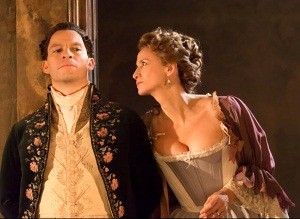 Even I, the self-confessed theatre addict, only managed two of those three openings myself — my reviews are here for Goodnight Mister Tom (in The Stage) and Les Liaisons Dangereuses (for London Theatre Guide, from which pictured, right, are Dominic West and Janet McTeer).
Even I, the self-confessed theatre addict, only managed two of those three openings myself — my reviews are here for Goodnight Mister Tom (in The Stage) and Les Liaisons Dangereuses (for London Theatre Guide, from which pictured, right, are Dominic West and Janet McTeer).
Of course I’d seen both plays before — Goodnight Mister Tom in its previous West End outing at the Phoenix in 2012, after missing its Chichester premiere in 2011; and Les Liaisons Dangereuses severally, from its original RSC production it its first transfer to the Barbican’s Pit, then the West End’s Ambassadors, in 1986; then in two separate, less successful revivals in the West End and on Broadway.
The West End one — at the Playhouse in 2003 — with a cast that included Polly Walker and Jared Harris, elicited this priceless review from Rhoda Koenig, then writing in The Independent:
Tim Fywell has certainly hit on a novel way of distinguishing his production of Christopher Hampton’s play from Howard Davies’s unforgettable hit of 1985. One might call this the Bugsy Malone version of Les Liaisons Dangereuses, but, not having seen the film in question, I may be doing its actors an injustice. They may have had more pathos and conviction than Fywell’s youthful cast, who certainly give the impression of a lot of children who have raided the dressing-up box.
Of the two leads, she goes on to say,
Polly Walker, whose inspiration for the role seems to have been Joan Collins (heavy eyeliner, hands on hips, saucy ringlets, wide smiles), is spoilt and petulant rather than blood-freezingly cool, and one never believes that she has the intellect and steel to formulate the cruel plan. Jared Harris is likewise immature as Valmont, her accomplice, a man whose latent sexual power is meant to be obvious and terrifying. Harris’s voice is flat and thin, and his mouth is often screwed into an expression that is presumably intended as blasé but looks as if he’s thinking: “Not sprouts again!”
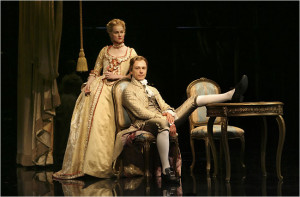 The Roundabout Theatre Company’s Broadway revival in 2008 at the American Airlines Theatre, which starred our very own Ben Daniels and Laura Linney (pictured left), with Mamie Gummer (Meryl Streep’s daughter) as the young love interest Cecile Volanges) was directed by Rufus Norris, now artistic director the National, which Ben Brantley dubbed “an eye-filling, very imbalance revival” in the New York Times. Daniels, he said, made “a sensational Broadway debut”, but Linney, he felt, was “uncomfortably cast.”
The Roundabout Theatre Company’s Broadway revival in 2008 at the American Airlines Theatre, which starred our very own Ben Daniels and Laura Linney (pictured left), with Mamie Gummer (Meryl Streep’s daughter) as the young love interest Cecile Volanges) was directed by Rufus Norris, now artistic director the National, which Ben Brantley dubbed “an eye-filling, very imbalance revival” in the New York Times. Daniels, he said, made “a sensational Broadway debut”, but Linney, he felt, was “uncomfortably cast.”
He went on to amplify,
Mr. Daniels provides both the silliest and most serious rendering I’ve seen of Valmont, who has been memorably played onstage by Alan Rickman (in the Royal Shakespeare Company production that came to Broadway in 1987) and on screen by John Malkovich (in Stephen Frears’s Dangerous Liaisons) and Colin Firth (in Milos Forman’s Valmont). His warm, fluid performance reflects what would appear to be Mr. Norris’s intention: to turn up the temperature in a work of famously icy cynicism. Unfortunately no one else in this revival approaches Mr. Daniels’s level of complexity, including Ms. Linney, a wonderful actress who has been shoehorned into a part out of her natural range and is perceptibly pinched.
I’ve seen every single one of these productions, and the Donmar’s is easily the best since the original. It returns the work to a studio space where it was originally created — it first premiered at Stratford-upon-Avon’s The Other Place — which amplifies the close-up intensity no end.
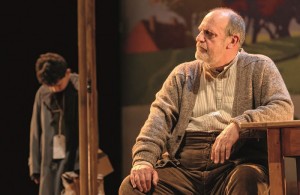 Earlier the same day, I saw a re-cast version of Angus Jackson’s original Chichester production of Goodnight Mister Tom, now with David Troughton (pictured left) in the role of the Dorset widower who takes in a London evacuee in Second World War Britain, originally played by Oliver Ford Davies, and I was very happy to see again, not just because Troughton is, like Davies, an instinctively warm an sympathetic actor, but that I was utterly delighted to find that the very youthful audience I saw it with at a matinee performance was extremely attentive. Producer Ed Snape told me afterwards they were keen for critics to see it with a ‘real’ audience, and so am I.
Earlier the same day, I saw a re-cast version of Angus Jackson’s original Chichester production of Goodnight Mister Tom, now with David Troughton (pictured left) in the role of the Dorset widower who takes in a London evacuee in Second World War Britain, originally played by Oliver Ford Davies, and I was very happy to see again, not just because Troughton is, like Davies, an instinctively warm an sympathetic actor, but that I was utterly delighted to find that the very youthful audience I saw it with at a matinee performance was extremely attentive. Producer Ed Snape told me afterwards they were keen for critics to see it with a ‘real’ audience, and so am I.
The same was true the day before at the press matinee for The Lorax at the Old Vic, which I reviewed for The Stage here. It’s the real test of this type of show if it can reach its intended audience successfully, and this one transcended that to reach me, too.
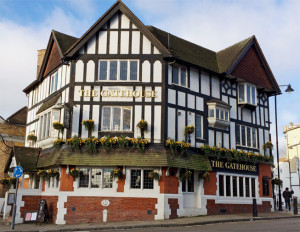 It was a week otherwise of revisiting musicals I’d seen before in new productions from Sheffield to Highgate, and a play in Islington. In Sheffield, I saw director Daniel Evans’s latest Christmas musical, the 1927 Broadway classic Show Boat (my review for The Stage is here); and in Highgate I saw the 19th annual Christmas show at the Upstairs at the Gatehouse (pictured right), which this year is a revival of another Broadway show of a more recent vintage, namely the 2007 musical version of the film Legally Blonde.
It was a week otherwise of revisiting musicals I’d seen before in new productions from Sheffield to Highgate, and a play in Islington. In Sheffield, I saw director Daniel Evans’s latest Christmas musical, the 1927 Broadway classic Show Boat (my review for The Stage is here); and in Highgate I saw the 19th annual Christmas show at the Upstairs at the Gatehouse (pictured right), which this year is a revival of another Broadway show of a more recent vintage, namely the 2007 musical version of the film Legally Blonde.
I adored both; though Show Boat is quite clearly the more significant achievement, both as a musical that has cast an enduring influence over the form itself and as a production that honours it so lovingly, I also gained a renewed respect for Legally Blonde, a show I’d previously thought was mere fluff, but in fact has a lot more punch than that.
Finally I caught up with Richard Eyre’s current return to the Almeida as he added Little Eyolf to a triumvirate of Ibsen plays he has now revived there that also includes Ghosts and Hedda Gabler, both of which transferred to the West End and were subsequently seen in New York. This short (but far from sweet) play about an already difficult marriage imploding after the death of a child is given a captivating restraint that also makes it all the more scorchingly powerful. I also liked the fact that it featured a cast of principal actors whose work I was mostly unfamiliar with. Invariably at theatres like the NT, RSC, Donmar or Almeida you see the same faces turning up again and again. These actors may have had some credits at those places, too — but here were stepping up for the first time for me to notice them for the first time.
I’ve still got quite a bit of catching up to do — having missed a bunch of openings after my hip replacement, then its subsequent displacement, I’m not quite finished with my theatregoing this side of Christmas. This coming week, I’ll be catching up with Linda at the Royal Court, Mr Foote’s Other Leg transferred from Hampstead (where I saw and loved it) to the Theatre Royal Haymarket, and the return of Bull to the Young Vic (in a re-cast version of the original production), as well as catching the launch of a new tour of The Rocky Horror Show at Brighton’s Theatre Royal.

